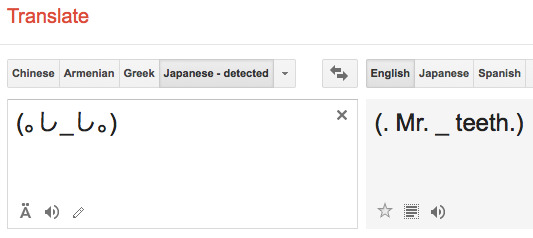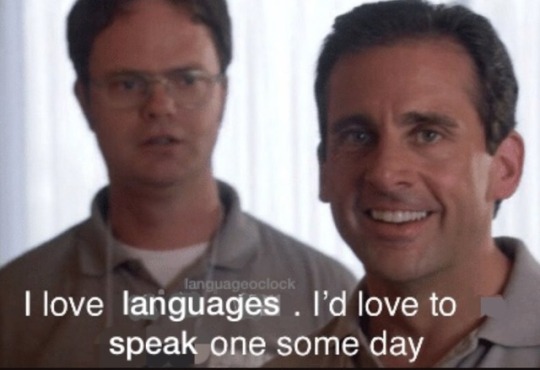Text
i don’t know why but i’m really amused by the winner of some ‘new kanji’ contest:
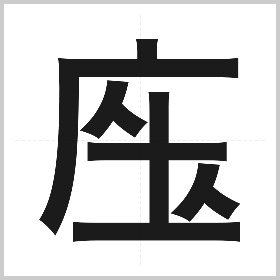
compare with the real kanji

座 (seat/gathering), but the two 人 (person) radicals have been moved from next to each other within the 土 (earth) radical to diagonally from each other, making this “social distance(d seating/gathering)”
92K notes
·
View notes
Text
The best part of any class that deals with phonetics/phonology/morphology is watching everybody carefully, silently, repeatedly mouthing every sound the instructor brings up, like:
Instructor: [is talking about schwa]
The entire class, every time:

870 notes
·
View notes
Text
Everyone’s like “those Germans have a word for everything” but English has a word for tricking someone into watching the music video for Rick Astley’s Never Gonna Give You Up.
467K notes
·
View notes
Text
The たら conditional
A conditional sentence is one that expresses a condition and a possible outcome.
“If I study, I will graduate.”
There are two conditional’s in Japanese たら and と. Lets focus on たら for now.
たら conditional corresponds to English clauses starting with “if” or “when”
Here’s the formula ; “Plain past tense form of verbs/ adj,/ copula+ら”
1.) 日本へ着いたら、電話してください。(nihon e tsuitara, denwashite kudasai) -> When/If you arrive in Japan, please call me.
2.) 勉強したら、卒業します。(benkyoushitara, sotsugyoushimasu) -> If I study, I will graduate.
3.) 大学に電車で行ったら、30分かかります。(daigaku ni densha de ittara, sanjuppun kakarimasu) -> If I go to University by train, it’ll take 30 minutes.
4.)学生だったら、もっと勉強してください。(gakusei dattara, motto benkyoushite kudasai) -> If you are a student, please study more.
*the main clause (following たら) can be non-past or past tense*
1.) 家に帰ったら、家の前に友達がいました。(uchi ni kaettara, uchi no mae ni tomodachi ga imashita) -> When I went home, my friend was in front of the house.
2.) 会社に歩いて行ったら、一時間かかりました。(kaisha ni aruite ittara, ichijikan kakarimasu) -> When I walked to work, it took one hour.
3.)クラスに行ったら、先生も学生もいませんでした。(kurasu ni ittara, sensei mo gakusei mo imasen deshita) -> When I got to class the teacher and students weren’t there.
*when the main clause is past tense it expresses something the speaker was surprised about*
4.)日本人だったら、もっとたくさん漢字を知っているんですけど… (nihonjin dattara, motto takusan kanji wo shitte iru n desu kedo…) -> If I were Japanese I’d know a lot more Kanji but…
5.) お金があったら、新しい車を買うでしょう。(okane ga attara, atarashii karuma o kau deshou.) -> If I had money I would probably buy a new car.
たら is also used when asking for or giving advice
1.) 日本語を勉強したいんですけど、どうしたらいいですか。(nihongo o benkyoushitai n desu kedo, dou shitara ii desu ka) -> I want to study Japanese, but how should I do it?
2.) 日本に留学したらいいですよ。(nihon ni ryuugakushitara ii desu yo) -> It would be good if you studied abroad in Japan.
3.)東京駅に行きたいんですけど、どうやって行ったらいいですか。(toukyou eki ni ikitai n desu kedo, dou yatte ittara ii desu ka) -> I want to go to Tokyo station, how should I get there?
4.)電車で行ったらいいでしょう。(densha de ittara ii deshou) -> It would probably be good to go by train.
474 notes
·
View notes
Text
Moderately Interesting Japanese Episode 9: Animal Proverbs in Japanese
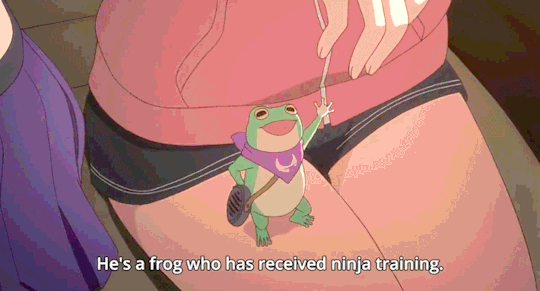
I have no idea what show this is from, but it’s so cute lol
I have a thing for Japanese. As you’ve likely noticed. And there are many aspects of the language that interest me, but one area in particular is 諺 kotowaza, or proverbs.
There are many intriguing proverbs, but today I’m going to focus on those that revolve around animals. How many did you already know?
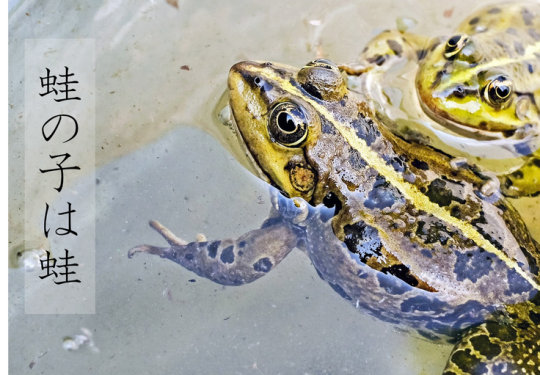
蛙の子は蛙
A frog’s child is a frog
Japanese pronunciation: Kaeru no ko wa kaeru
English equivalent: Like father like son.*
I put an asterisk next to the English equivalent because it is not 100% equal. The English expression “like father like son” is often used in a positive light, expressing pride in the child for taking after the parent’s good qualities. It can also be used in a negative way, but I feel that the positive nuance is stronger.
However, the Japanese expression is only negative. When a frog is born it is not a frog but tadpole, which looks like an entirely different animal. Slowly but surely, though, the frogspawn changes until it is identical to its parents. This is a metaphor for children who seem able of surpassing their parents, but who ultimately wind up just like them.
For example, say that there are a mother and father who are not artistically inclined, and their young daughter draws a pretty good picture. They think that she will become a great drawer much better than they could ever be, but as time passes they realize that she is just as mediocre at drawing as they are. They may sigh and say, “Kaeru no ko wa kaeru.”

鹿を追う者は山を見ず
He who chases the deer fails to see the forest
Japanese pronunciation: Shika wo ou mono wa yama wo mizu
English Equivalent: You cannot see the wood for the trees.
Imagine a hunter who chases a swift deer through the mountain forest. He is so intent on his prey that he does not realize where he going, and by the time he has caught the deer, he is completely lost and darkness is falling. This expression is about people who are so fixated on one thing that they lose sight of other important things.
This expression is very similar to the English “You cannot see the wood for the trees,” which refers to someone who does not notice small but crucial details.

猫に小判
Gold before cats
Japanese pronunciation: Neko ni koban
English equivalent: Pearls before swine
A “koban” is a large gold oval coin that was used for many centuries as currency in Japan. You could think of it as a hundred dollar bill in terms of worth compared to other Japanese coinage at the time.
Naturally, while a koban held a large amount of significance for any person, if you gave it to a cat the cat wouldn’t know what to do with it. It would probably give it a curious whiff and then walk away. This expression is used when someone’s gift or efforts are wasted on the recipient. It’s the exact same as the English “pearls before swine.”
Also, as a fun little side-note, anybody who’s in my generation or younger should know this, but can you name the first-generation cat Pokemon that was a Team Rocket henchman? Do you remember what he had on his forehead?

Who’s that Pokemon?! It’s Meowth! The golden coin on his forehead is shaped like a koban and is a reference to this proverb. There’s a fun fact you can share with your Pokemon-loving friends.

前門の虎、後門の狼
A tiger at the front gate, a wolf at the back gate
Japanese pronunciation: Zenmon no tora, koumon no ohkami
English equivalent: Between the devil and the deep blue sea, or, between a rock and a hard place
Imagine that you have sneaked into the enemy’s fortress but were seen by the guards. You must escape through either the front or rear gates of the castle walls, but at the front gates waits a ferocious tiger and at the rear gates snarls a hungry wolf. Either will end poorly for you, yet you must choose one or the other. This expression refers to a situation in which neither of the available options are good.
When thinking of an equivalent English expression, the first one that came to mind was “between a rock and a hard place,” but it turns out that this expression is only about 100 years old. I wanted something with a bit more seniority, and that was when I stumbled across “between the devil and the deep blue sea,” which I had only known as a lyric in an Aerosmith song until then haha. It turns out this expression was first recorded in English almost 400 years ago though.
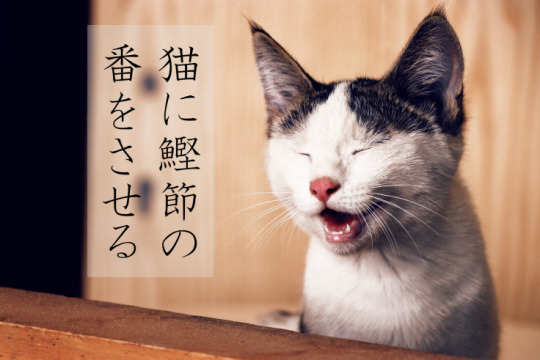
猫に鰹節の番をさせる
Setting the cat to guard the dried fish
Japanese pronunciation: Neko ni katsuobushi no ban wo saseru
English equivalent: Setting the fox to guard the henhouse
I really like this one. First, you need to know what “katsuobushi” is, which I loosely translated as “dried fish.” It’s actually tissue paper-thin shavings of dried bonito, and cats absolutely love the stuff. And why wouldn’t they? It’s got the strong taste and smell of fish that they crave without the hassle of having to pick out bones or tear through scales.
Therefore, you can imagine that a cat would not a trustworthy guard make. This expression is identical to the English “setting the fox to guard the henhouse.”
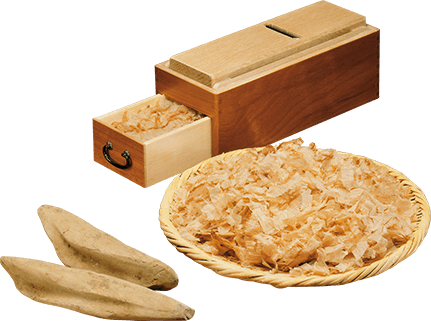
They smoke the bonito for a ridiculously long time until it looks like a fossilized banana, and then they shred it up with a fancy box. Voila, katsuobushi.
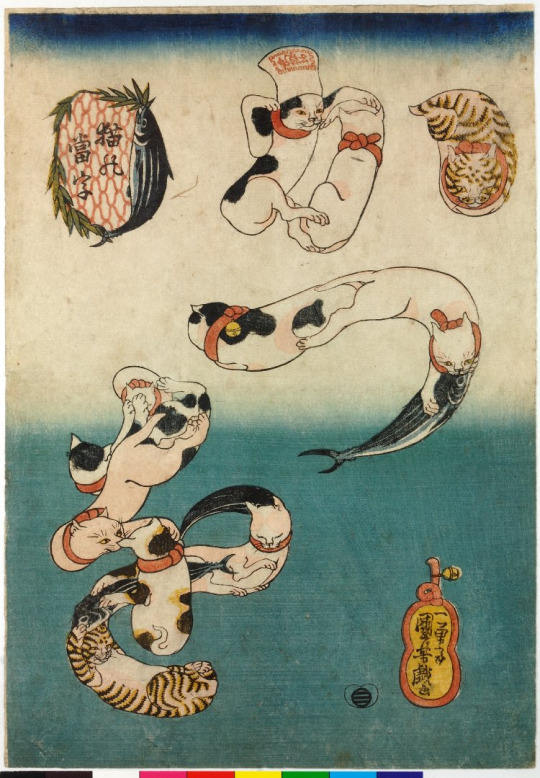
This is an official advertisement for katsuobushi from about 1843. The cats are spelling out かつを (katsuo).
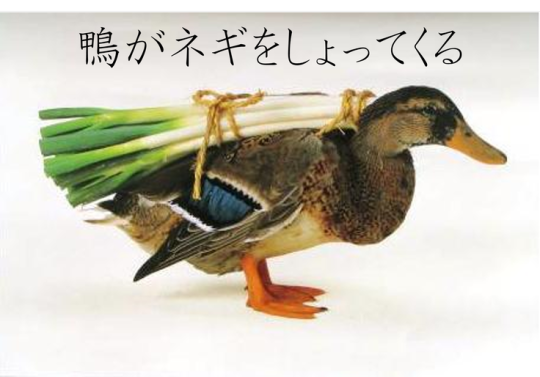
鴨がネギをしょってくる
A duck comes bringing leeks
Japanese pronunciation: Kamo ga negi wo shottekuru
English equivalent: ??
This one is a bit of head-scratcher lol. First, you need to know that there is a Japanese dish called “kamo nabe,” which is a duck stew with leeks. If a duck comes to you on its own, that in and of itself is a good thing for you. If it is also carrying leeks, it is even better. In other words, this expression is used when two or more convenient/beneficial things happen at the same time.
However, there is another underlying message of this expression that makes it difficult to find a matching English expression. That is, that the duck who unknowingly seals his fate is naive/foolish. Also, a duck is seen as an easy-to-trick or simple-minded bird. (Think of the English expressions “sitting duck” and “lame duck.”)
Specifically, this expression is used when Person A unknowingly does something beneficial for Person B that will later come back to hurt Person A.
I hunted for an equivalent expression in English but couldn’t find one. If you know of one in English or another language, please let me know in the comments!
Also, there is another Pokemon based on this expression. Do you know which one it is?
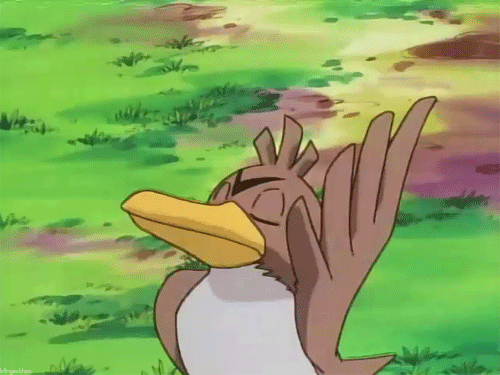
Yep, it’s Farfetch’d! Its name in Japanese is カモネギ (Kamonegi), or Leek Duck. Two Pokemon facts in one post? How much better can it get?
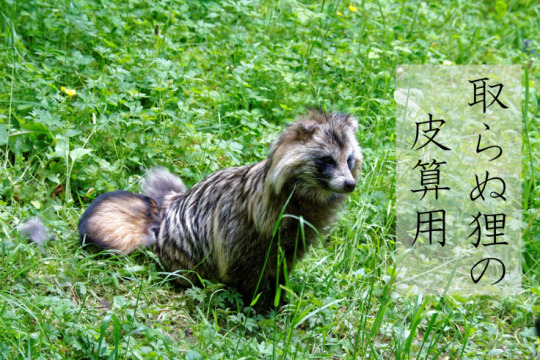
取らぬ狸の皮算用
Counting the pelts of raccoon dogs one has yet to catch
Japanese pronunciation: Toranu tanuki no kawazanyou
English equivalent: Counting your chickens before they’ve hatched
The Japanese version of this well-known expression is decidedly darker than the English one. Imagine a hunter laying a dozen traps for raccoon dogs (called “tanuki” in Japanese) and bragging to his friends how he was going to catch 12 in a day. Upon checking the traps, he sees that he has only caught five. His friends would say, “Don’t count your pelts before you’ve caught them.”

立つ鳥跡を濁さず
A bird taking flight does not foul the water
Japanese pronunciation: Tatsu tori wa ato wo nigosazu
English equivalent: Burn no bridges
This expression can be heard on an almost daily basis in Japan. When a bird takes off from the water, it leaves behind clear, clean water only. There is no trace that it was ever there once the ripples have faded.
This is most commonly used when someone quits their job. It is important to leave no unfinished business or messes for your coworkers to clean up after you, and of course you want to leave on a good note with everyone. When you depart, you should make sure that you leave no unfavorable traces of yourself behind.
I guess that the closest English expression would be “burn no bridges,” though I saw several people stating “It’s an ill bird that fouls its own nest” as an equivalent. I feel like that expression is different, though, because it focuses more on the the perpetrator and less on the people around him, while the Japanese expression is all about making sure not to inconvenience others.
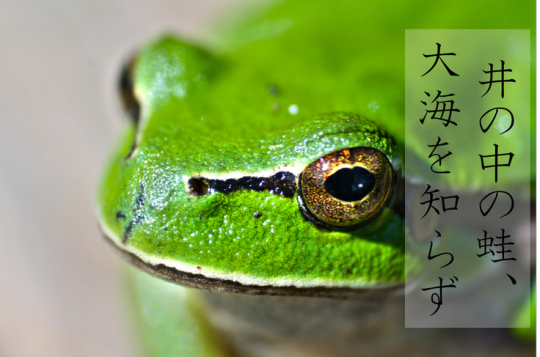
井の中の蛙、大海を知らず
A frog at the bottom of a well knows nothing of the great ocean
Japanese pronunciation: I no naka no kawazu, taikai wo shirazu
English equivalent: He that stays in the valley shall never get over the hill.
We all know at least one person who is woefully narrow-minded, not for lack of effort but simply because their world extends only to their city limit. They do not travel, do not have friends from varied backgrounds, and do not actively seek out the unfamiliar. This leaves them unaware of all the world has to offer.
The Japanese expression summarizes this predicament beautifully. A frog living in the bottom of a well may think that he is in the great expanses of the sea, but in actuality is in a prison, starved from all the wonders of light and sensation that are waiting outside the well.
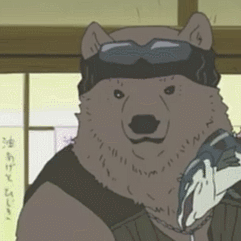
The End!!
I hope you guys enjoyed today’s Moderately Interesting Japanese. Work has been…absolute chaos. My old boss was moved to a new project within the company. They’re shorthanded and I’ve been asked to translate over 30,000 pages of high level tech training materials (that I have no experience/knowledge of) into Japanese…in 5 weeks…on top of my regular duties… Needless to say I am exceedingly close either to drinking enough caffeine that my third eye opens, my chakras align, and I become an omnipotent god, or a mental breakdown. But I only have 2,000 more pages to go until I’m finished!
My queue of word of the day posts is running low and it might be a few days until I can get some more ready, but please be patient. I still have tons of cool words I want to share with you! ♡
4K notes
·
View notes
Text
pokemon names in toki pona
these are not transliterations, because that would be too easy! instead i made up punny names from toki pona words
bulbasaur: akasili
ivysaur: akasi
venusaur: akasuli
charmander: akeselili
charmeleon: akeseli
charizard: wakeseli
squirtle: akeloli
wartortle: akelo
blastoise: akesulo
caterpie: pipili
metapod: pipiwen
butterfree: pipona
weedle: pipilike
kakuna: kiwenpike
beedrill: pipike
pidgey: wasipi
pidgeotto: wasona
pidgeot: wasuli
rattata: sowepipi
raticate: sowepipike
spearow: ikaso
fearow: sulikaso
ekans: akesike
arbok: akesulike
pikachu: sowelo
raichu: sowawali
sandshrew: sowema
sandslash: sowenki
nidoranf: melilike
nidorina: melike
nidoqueen: mesulike
nidoranm: limikeje
nidorino: mikeje
nidoking: sumikeje
clefairy: suwili
clefable: suwimun
vulpix: seliweli
ninetales: somuteli
jigglypuff: suwike
wigglytuff: suliwi
zubat: wasoweli
golbat: wasowelike
oddish: kasike
gloom: kasikeike
vileplume: kasuwike
paras: kililipi
parasect: kilipi
venonat: pipilisike
venomoth: wapipike
diglett: sowanpa
dugtrio: mutesowanpa
meowth: sowemani
persian: ponoweli
psyduck: waselo
golduck: lawaselo
mankey: utawelili
primeape: utaweli
growlithe: ponoweseli
arcanine: ponowesuli
poliwag: telikesike
poliwhirl: telakesike
poliwrath: utalakesi
abra: sowelilawa
kadabra: sowelawa
alakazam: suwelawa
machop: utalilan
machoke: utalan
machamp: ponutalan
bellsprout: kasinja
weepinbell: kasikelin
victreebel: mokasike
tentacool: ikalali
tentacruel: ikala
geodude: likiwen
graveler: kiwenale
golem: sukiwen
ponyta: taselili
rapidash: taseli
slowpoke: ikalawa
slowbro: ikalawen
magnemite: kiwawen
magneton: kiwawenute
farfetch’d: wasi
doduo: wasotu
dodrio: wansotu
seel: kalaweli
dewgong: kalawelo
grimer: ikeloli
muk: ikelo
shellder: kalawen
cloyster: utalawen
gastly: lilikon
haunter: ikon
gengar: ikoneja
onix: akiwenesi
drowzee: sowelape
hypno: sowelapike
krabby: lojala
kingler: sulojala
voltorb: walike
electrode: wawike
exeggcute: mutasike
exeggutor: mutasi
cubone: somolili
marowak: somoli
hitmonlee: utaloka
hitmonchan: utalanpa
lickitung: mokesi
koffing: sikon
weezing: tusikon
rhyhorn: sowekiwen
rhydon: suwekiwen
chansey: suliwi
tangela: linkasi
kangaskhan: mamaweli
horsea: konala
seadra: kalakesi
goldeen: kaleli
seaking: ukala
staryu: munkala
starmie: munkalawa
mr. mime: janpin
scyther: utapi
jynx: melete
electabuzz: wawelo
magmar: waseli
pinsir: pipasa
tauros: soweliwen
magikarp: kalili
gyarados: molala
lapras: ponkala
ditto: tusina
eevee: sowelante
vaporeon: telante
jolteon: wawante
flareon: selante
porygon: lawaso
omanyte: pikaliwen
omastar: pisuliwen
kabuto: pinukala
kabutops: pinsukala
aerodactyl: pinaso
snorlax: mokoweli
articuno: wansete
zapdos: tuwawaso
moltres: muwaseli
dratini: wawakesili
dragonair: wawakesi
dragonite: wawakeso
mewtwo: mutu
mew: mu
46 notes
·
View notes
Text
In traditional Irish folktales, the elves only understand/respect Gaelic: the English language revolts them, so don’t expect to be winning any of those famous riddle contests or song tournaments in English.
I’ve idly considered making one of those memes where it’s like [THE IRISH] *brofist* [THE JEWS] and the point of agreement is “our language is magic,” but the joke would take too much explaining to be funny.
A lot of Irish Gaelic is structured around speech and the power of language. There isn’t, for example, a word for “yes” or “no.” In order to answer a direct yes/no question, you have to use a form of the verb that was used to ask the question. So basically, if the question is–say–”did you murder your wife” then there is no way to simply say “Yes, Your Honor” or “No, Your Honor.” Your minimum required effort involves using the verb that was invoked in the question: “I murdered,” or “I didn’t murder.”
Of course you can just as easily, in just as few syllables and maybe fewer, change the verb. “I was framed,” maybe. Which is to say that the most basic speech acts in Irish involve constructing a narrative, assenting to others’ narratives or challenging them, and most crucially elaborating on the narratives that have already been established.
(I chose murder just to be a colorful example, but actually I need to go back to my language reference books and check because I bet this interacts interestingly with the tendency in Irish for the narrator never to be the subject of her own story. You’re always the object, in Irish: you can’t drop a plate, for instance, the plate drops itself at you. You’re not thirsty but a powerful thirst is on you. You didn’t murder that woman but she very well might have gotten murdered in your general vicinity.)
You see this lots of other places in the language too. For instance there’s also no word for “hello” or “goodbye.” If you want to greet somebody your required minimum is to cough up a formulaic blessing: Dia duit, God be with you.
Here’s the thing. The second person can’t just be like “yup, uh huh. dia duit.” No. The stakes have been raised. The second person’s required minimum answer is now Dia’s muire duit, God and Mary be with you. If a third person joins they have to invoke St. Patrick on top of the two already mentioned. I’m not kidding. At four people you do hit a limit where you’re allowed to just say “God be with all here,” but in the very traditional country pubs it’s an insult to cross the threshold without saying at least that to cover everyone inside. Actually worse than an insult; basically a curse. That’s the burden you bear when you start speaking a magic language.
34K notes
·
View notes
Photo

thank you anonymous for this wonderful gift
32 notes
·
View notes
Text
tenpo tawa la mi wile ala kama sona e toki pona li wile ala sitelen e sitelen sitelen e sitelen sike Kalifejan la mi pali ala. tenpo tawa la toki pona li pona lili tawa mi. taso, tenpo ni la toki pona en toki ante li pona mute tawa mi. tenpo kama la mi wile pali mute. mi olin e sina ale! o pona!!
#this is probably all written wrong but uhhh#basically#ive been kind of not doing any toki pona#and other then the gallifreyan bullshit ive been kinda up to#i want to post more here#and i want to be solid on toki pona#um hmu and ill add an actual translation but im tired rn#but have a nice day or night or whatever#and i love you#linguistics#toki pona#sitelen jelo
1 note
·
View note
Text
So I’m already taking Japanese classes, but every once in a while I’ll go on a Duolingo binge and be reminded that Japanese has a different counting word JUST FOR RABBITS AND BIRDS.
#man why#an upside to japanese is that it has an inventory and phonotactics that are pretty easy for english speakers#but man#sometimes#that grammar#japanese#langblr#studyblr#linguistics#text post#uhhh#rabbits#birds
4 notes
·
View notes
Text
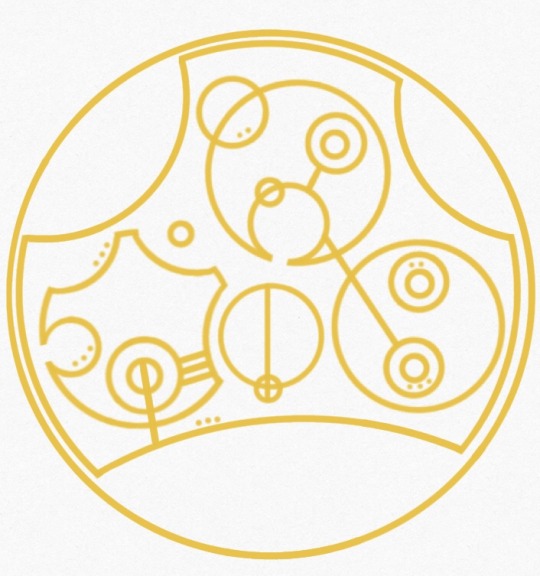
Sup y’all! I saw a post about a character writing in circular gallifreyan and I was like “hey! That sounds like a Cool Time™️” so I, having only watched maybe one episode or so of Doctor Who, decided to learn it. It took way too long on a shitty drawing app on my phone, but this says “I like honey mustard!”
#sorry but uhh#honey mustard good#and its yellow so#consider me a honey mustard man#sentences made with actual circles take a while cuz the geometry functions are hard to manipulate#anyways#circular gallifreyan#linguitics#doctor who#gallifreyan#conscripts#honey mustard#calligraphy#?#does that fit idfk#im going to bed
6 notes
·
View notes
Photo
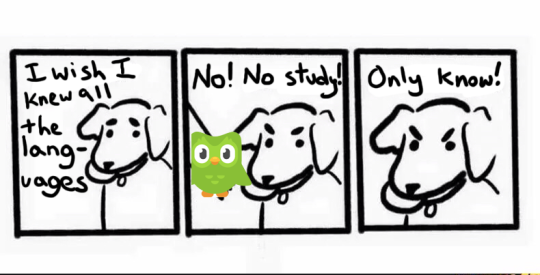
#wow i sure post ALL the time on this blog#the only semi linguitics thing ive been doin is some circular gallifreyan#which uhhh slaps#but idk if it really fits
138K notes
·
View notes
Text
sina sona ala la o kama sona e ni: mi olin e sina. sina pona ale tawa mi.
#unless ur a terf#or generally transphobic#or racist#or etc#otherwise!#i love you#toki pona#linguistics#positivity#conlang#tojo#post
8 notes
·
View notes


